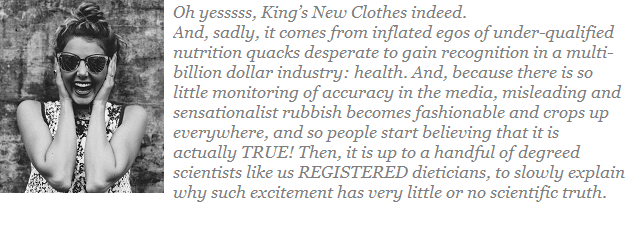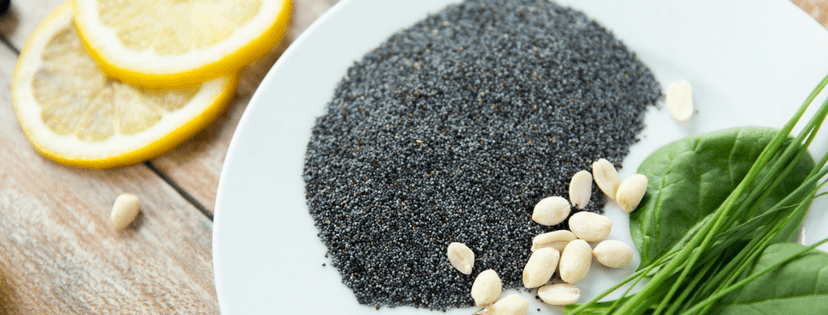When I was little, I remember being given a little red, shiny tablet every morning after breakfast. “To make you strong and energetic” was the reason for the ritualistic dispensing of the iron supplement.
I still remember the complete delight as I felt the strength and energy welling up inside me as the tablet went down to my tummy. It was lovely. And all at once: I was strong and energetic. Immediately. Thank you red iron pill.
As humorous as this might seem to adults (because we know that one cannot absorb immediate strength and energy from one tablet) many patients I see search for this magical occurrence, thanks to the media and pop nutrition (popularly-believed unscientific nutritional ‘advice’).People HONESTLY do seem to be buying the hype that certain individual foods have supernatural qualities that will deliver such extraordinary levels of magical nutrients that almost instantaneous wellbeing and disease prevention is established. The unqualified nutrition gurus call them
“Superfoods”.
This is NOT a scientifically-recognised term.
Now, don’t get me wrong. I am so fascinated by the influence of nutrition on the body that I dedicated my entire life to the continual study of health and disease prevention. I’m a clinical dietician! As such, I have witnessed first-hand, that the power of correctly dispensed nutritional advice for different disorders and diseases is indeed, marked. However, I also know enough about the SCIENCE of dietetics to say with strong conviction that no one food has such magical qualities to cure disease.And there is NO SUCH THING AS A ‘SUPERFOOD’.
It is an exciting catchword that sparkles on plumped lips at dinner parties. It offers the snake oil to people needing immediate gratification. It offers a placating prop to those who are fearful of ‘not having done all they could to prevent disease’.
After all, we know that cancer prevention advice suggests reducing charred meats and losing excess body fat, as well as increasing anti-oxidants that are found in fruit and vegetables. But sadly, many people find eating that much fruit and veg exhausting and, well, a tad irritating when life is frantically busy. So, because berries promise a bit of a higher concentration of anti-oxidants, we have a daily smoothie with the “Superfood” berries in it, and we are told that we won’t develop cancer. How fabulous! And because it’s so expensive, it must promise even further magical health properties, right….?

The truth is, all registered dieticians (for whom it is ILLEGAL to give advice unless it is soundly scientifically accepted) will tell you one catchphrase.
“ALL FOOD FITS”
It’s not as sparkly a phrase as its “Superfood” comrade, and holds many less promises for quick-fixes. But it’s true. It’s factual. And it’ll never change.
I can tell you with pretty strong confidence that you are NOT protected from cancer if you juice berries all day. It will decrease the chances of SOME cancers developing, but the likelihood of that benefit has to be weighed against the amount of cancer-promoting aspects of our environment: it simply won’t be magical enough to protect against the enormous stress modern day life throws at us, for instance. And the seemingly ‘harmless’ two to three glasses of wine each night does far more damage than the berries can fight.What’s more, there is a far less glamorous food than berries, that delivers possibly more of certain antioxidant benefits: cabbage. But you tell me…which sounds better at a dinner party? “Superfood smoothie” or “boiled cabbage”? Hmmm. Kale and quinoa are other ‘Superfoods’ that are expensive enough to take centre stage in glossy magazines. Much cheaper alternatives have been around for much longer, I can promise you.
You see, the media loves the frenzy and hype and is now spouting forth a kind of ‘religious cult’ sentiment surrounding how some foods can “HARM” and some foods can “HEAL”. I, too, used to like the sound of this ‘recipe’ for optimum health, until I realised that, as most things in life, it’s just not that simple.If you juice fruit and veggies all day and only eat organic, unsweetened yogurt, you will feel ‘clean’ simply because your head tells you that. It mimics those wonderful photographs of fresh, cool and dewy vegetables in the black earth of a local farmer. So, if you are what you eat, then surely eating loads of these will make us feel fresh, cool and dewy (a welcome sentiment after a Christmas dinner indulgence). But the fact is that the ‘Clean Eating’ hype has now influenced people to over-consume these foods (the raw juicing craze promises age-reversal and everlasting vitality). However, we now have the effects of over-consumption of some foods and a resultant, drastic underconsumption of others, leading to certain new disorders rising out of the blue. The results are, worryingly, fatty liver disease, elevated cholesterol, and gastrointestinal inflammation, to name a few.In the quest for eternal youth and maximising consumption of said anti-oxidants, people are hitting excess whilst completely forgetting the rest of what is needed for the body to function normally: for instance, regular slow-release carbohydrates. Having just a ‘superfood’ salad for lunch, for instance, ignorantly forgoes the all-important carbohydrate inclusion, to keep blood glucose levels steady and maintain stable moods and concentration! (Look out for the next newsletter on Detoxing for a good smile).
Along the same lines, while no one ‘Superfood’ is the ANSWER to disease prevention or cure, neither, too, is any one food the CAUSE of any disease! It takes a period of time of over- or under-consumption of many different foodstuffs to create problems. And it honestly is quite a slow process, too!

What’s more, there’s the devastating misinterpretation of research leading to the current frenzied maligning of carbohydrates. How wretched.Now, “Give us our daily bread” or breaking the Challah suddenly take on a terrifying denotation of disease, bloated bellies and neurosis rather than the beautiful and age-old symbolism of health and spiritual solidarity.
Food means so much to us. We just need to know how to slot it into our lives.You see, the only way any food can create any problem at all is if you haveTOO. MUCH. OF. IT.And this is where the scientific knowledge and sensibility needs to come in. How much is too much? This depends on the body, the disorder and the food type itself. And this is why registered dieticians exist.Putting a teaspoon of cane sugar onto an otherwise slow-release, nutrient-rich, high-fibre bowl of oats porridge is completely acceptable. Nice even, wouldn’t you agree? And in this context of sensible and scientific advice, MANY of my type 2 diabetics eat a teaspoon of sugar sprinkled over their porridge in the mornings and maintain incredibly good plasma glucose control. (I’m not interested in my diabetics attaining ‘below 10mmol/L’ status. I insist on below 7mmol/L).
Taking it one step further, research has even begun to show that people who completely cut out all sugar from their diet are actually MORE OVERWEIGHT than those who use it…. Because they are much more prone to binge-eating disorder. And we know the morbid health risks associated with this disorder, don’t we?Moderation, people. Moderation!
You see, the fear of some foods probably comes from the problem of excess consumption of certain delicious foods which arises because the human condition often requires the opportunity to immediately remedy anguish arising from poor emotional life choices.Sugary foods taste (and make us feel) lovely, so it is easy to overconsume such pleasures, to the complete exclusion of any semblance of balance or variety. Especially if food is the only way we find relief from problems. THIS is the problem….. NOT the sugar itself! Another parallel to this is alcohol; one glass of Merlot at a dinner party or two glasses of bubbly every now and then at a wedding is wonderful, safe and is actually accepted as a part of a healthy, balanced diet. However, two goldfish bowls of wine each night coupled with weekends of shooters and blackouts is a one way ticket to an early burial. That’s EXCESSIVE. And such excess harms (even kills). But does that mean that we need to scrutinize each and every product we consume for traces of alcohol? NO! It’s NOT BAD for you! Alcohol does no harm! UNLESS WE, STUPID HUMANS, PUSH IT TO EXCESS. And the line past which one crosses (for it to become dangerous) is different for each person. Your dietician will clarify all of this for you.



